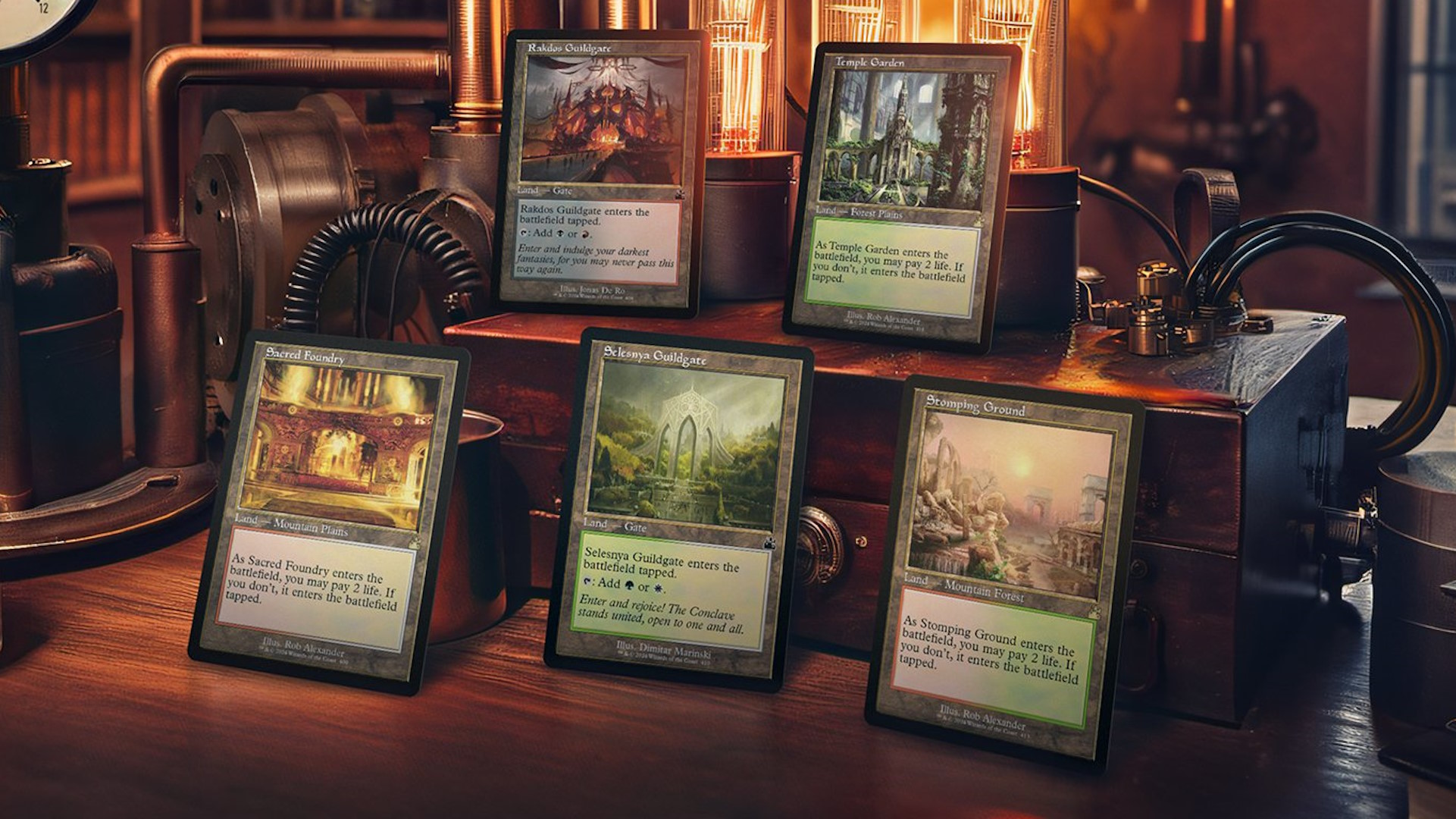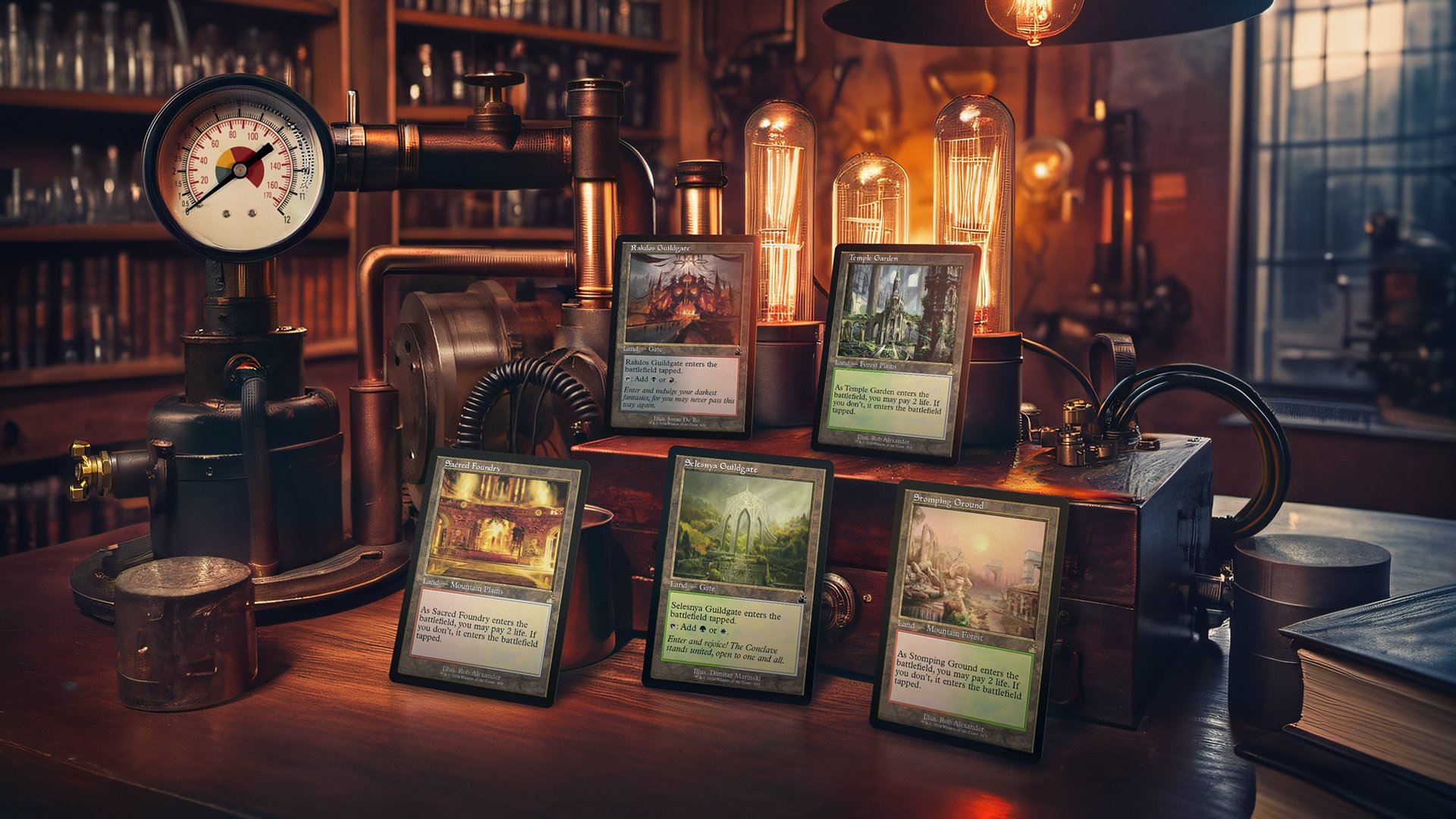Wizards of the Coast reverses course, admits to using AI in promotional image: 'Well, we made a mistake earlier'
The tabletop publisher had firmly denied using generative AI to make the promo image, which has since been deleted.

After sharp-eyed Magic: The Gathering fans cried foul over a recent promotional image's seeming use of generative AI, Wizards of the Coast initially asserted that it was fully human-made. However, just two days on Wizards has deleted the offending marketing post and acknowledged that generative tools were used in the image.
The picture in question situated five new MTG cards (with their human-made bona fides, at least, not in question) on a desk in a steampunk-flavored apothecary-come-bookstore. All well and good, but minute details in the image showed telltale signs of it having been made with AI tools, namely the filaments in the lightbulbs, some of the wiring on the desk, and ticks on the pressure gauge. It's all in line with image generation tools' consistent failure to render fine detail like fingers, teeth, and text.
That'd be a bummer on its own, but this comes after Wizards of the Coast swore off AI art entirely following its controversial use by a longtime freelancer in a Dungeons & Dragons sourcebook. Wizards initially denied that the MTG promotional image was made using generative AI tools, stating: "We understand confusion by fans given the style being different than card art, but we stand by our previous statement. This art was created by humans and not AI."
Magic fans were not convinced though, and even some artists who work with Wizards of the Coast expressed alarm and dismay. Illustrator Jason Rainville stated that he was considering alternate sources for commissions if Wizards would be pursuing this tech despite its prior statements, though the artist has since retracted that criticism following Wizards' admission and promise to do better. Artist Dave Rapoza, on the other hand, declared he was done working with Wizards of the Coast entirely: "You can't say you stand against this then blatantly use AI to promote your products, emails sent, goodbye you all!"
On Twitter, Wizards of the Coast stated that the image background was sourced from a third-party vendor, and claimed that "It looks like some AI components that are now popping up in industry standard tools like Photoshop crept into our marketing creative, even if a human did the work to create the overall image."
Wizards elaborated further in a statement on its website:
"We already made clear that we require artists, writers, and creatives contributing to the Magic TCG to refrain from using AI generative tools to create final Magic products. What’s now apparent is that we need to update the way we work with vendors on creative beyond our products—like marketing images we use on social media—to make sure that we’re supporting the amazing human ingenuity that is so important to Magic.
Keep up to date with the most important stories and the best deals, as picked by the PC Gamer team.
"Along with so many others, we also want to get better at understanding whether and how AI is used in the creative process. We believe everyone benefits from more transparency and better disclosure. We can’t promise to be perfect in such a fast-evolving space, especially with generative AI becoming standard in tools such as Photoshop, but our aim is to always come down on the side of human made art and artists."

The issue of a third party artist or vendor using AI tools without disclosing such definitely seems like a tricky one for companies like Wizards of the Coast—it was, after all, the reaction against artist Ilya Shkipin's use of the tools in the Glory of the Giants sourcebook that prompted Wizards to take firm stand on the issue in the first place.
Wizards of the Coast has a real incentive to get this right. As important as its rules, systems, and worldbuilding are, one of the main things it's selling with Magic cards and tabletop sourcebooks is art—if the art Wizards sells becomes devalued by shoddy AI work while the company's relationship with illustrators is poisoned in the process, that's a huge problem.
The company's initial firm denial is upsetting, but that aside, I think Wizards has made the right call by retracting the art, admitting that it was created with generative AI, and outlining how it will avoid mistakes like this in the future.
The flood of low-quality AI art on the internet seems to be creeping into commercial use, and it feels like we've all been deputized to try and suss out what's real or fake, not unlike how we've all become accustomed to having unprecedented media literacy when it comes to discerning misinformation out there on the world wide web.
Sometimes that can lead to false positives, like with another piece of D&D art that was accused of being AI generated before getting exonerated last month. And we're just getting started: some commenters online have accused Apex Legends of using AI generation for key art in a recent trailer for its Final Fantasy Rebirth crossover event, while tablet manufacturer Wacom pulled a promotional Twitter post that was accused of having used AI art.
We are one week into 2024, but the burgeoning "AI revolution" has me thinking we're in for a long year indeed.
Ted has been thinking about PC games and bothering anyone who would listen with his thoughts on them ever since he booted up his sister's copy of Neverwinter Nights on the family computer. He is obsessed with all things CRPG and CRPG-adjacent, but has also covered esports, modding, and rare game collecting. When he's not playing or writing about games, you can find Ted lifting weights on his back porch.

